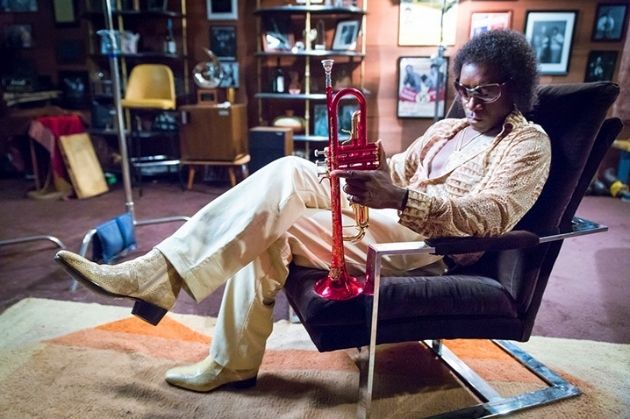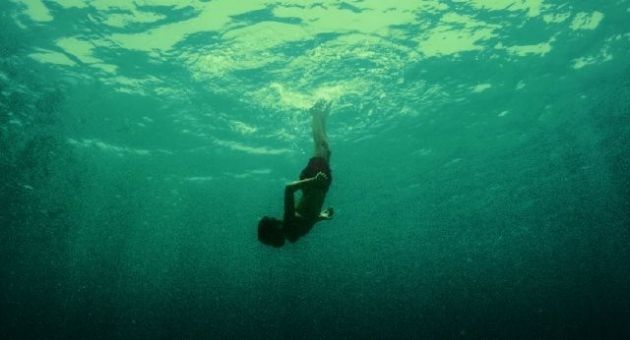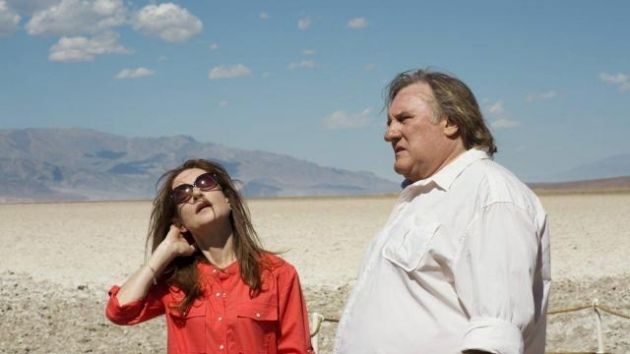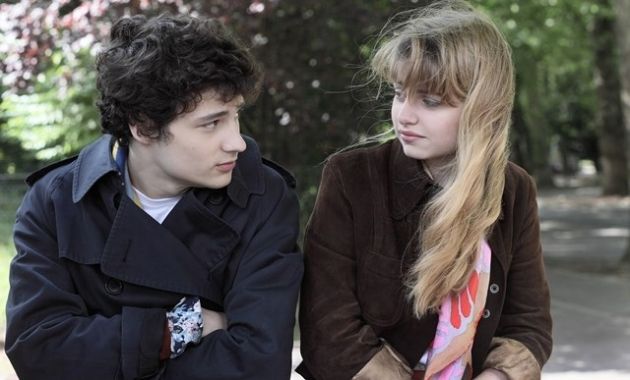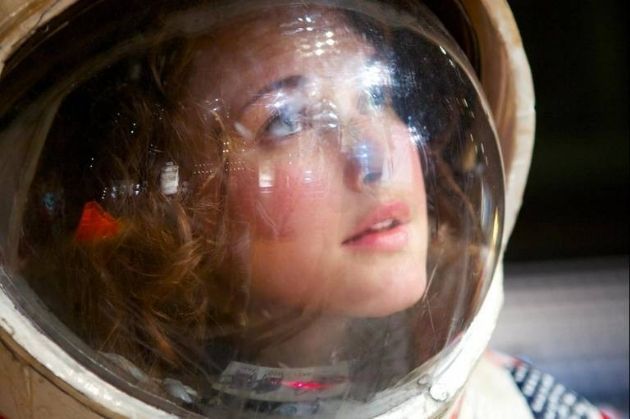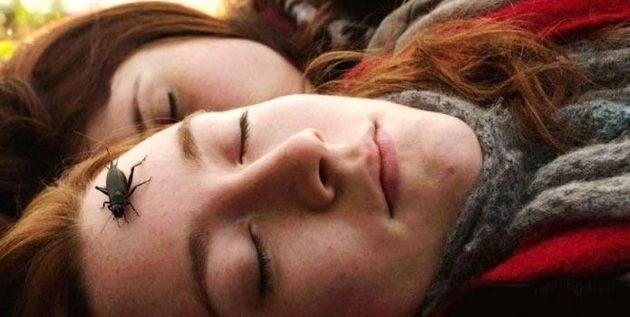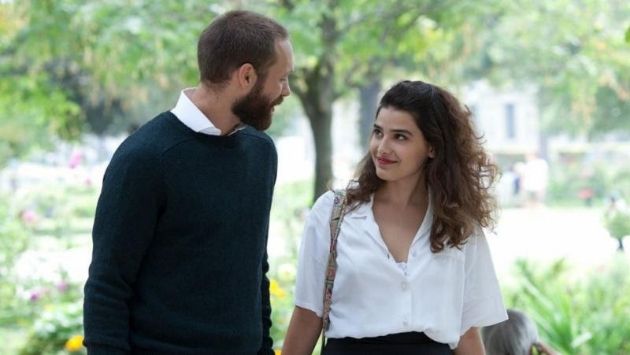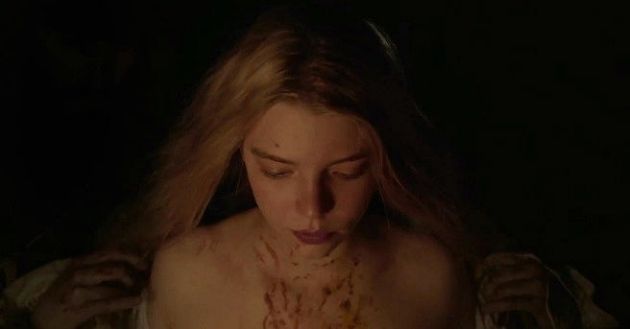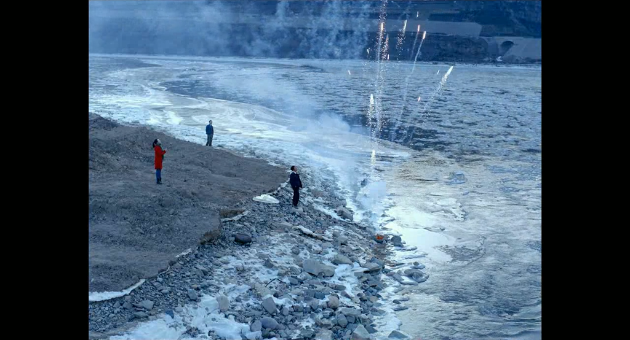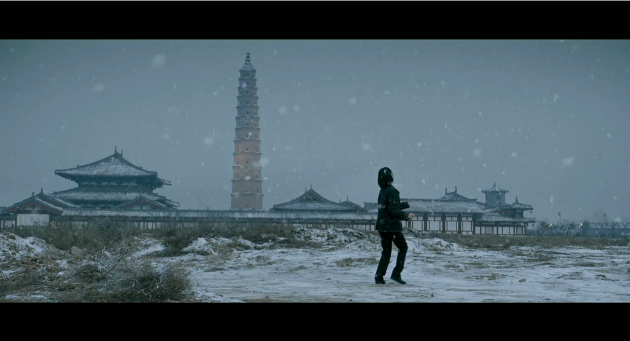
Got a chance to attend a roundtable interview with the star, director and co-writer Don Cheadle and his co-star Emayatzy Corinealdi for his unconventional Miles Davis biopic, Miles Ahead which opens this weekend in New York and LA. Clearly a passion project for Cheadle, he talks in-dept about how he became involved in the project that's been brewing for such a long time. He and Corinealdi also talk about trials and tribulations of low-budget independent filmmaking and channeling the real life subjects.
Q: How did you get in to that raspy Miles Davis voice?
Don Cheadle: It’s just listening and trying to find where it’s centered and…just working on it. It feels like a second skin, I guess in a way. And staying in it, you know. It was something that many days I had to stay in to keep it there. It was tricky because when you were directing from across the room. (laughs) So there was a lot of getting up and crossing the room to talk to people.
Did it ruin your voice though?
DC: No I don’t think so. Tried to support it and do it the right way so you are not just tearing your throat out.
The thing I like the best about the film was the energy and I really felt like your filmmaking technique was mirroring Davis’s iconoclastic, restless approach to music.
DC: That’s what the intent was of course. To create something that felt like Miles as opposed to doing a document that is kind of didactic - this is when he met Charlie Parker, then he met John Coltrane…you know, there are books that cover his life like that, there’s documentary, there’s radio play, there’s articles, there’s a lot of places that you can check off all the achievements and get cliff notes of his life. I wanted to do something that felt impressionistic and expansive and creative and dynamic and… Frances can be doing a pirouette toward Miles in the past and Dave Brill can finish her fall in the present, Miles looses Frances in a sort of a spin and then and it wakes Dave out of a dream. I wanted you to feel like you are walking around Miles Davis’s brain.
I love the transitions. They were so brilliant.
I thought this project was something you were born with that you had to tell Miles Davis story. But it was his nephew and son who said “we want Don Cheadle to play Miles Davis”. And you weren’t aware of this fact.
DC: I was looking to do anything but another movie about a historical figure. At that point I had done the Rat Pack and Rebound and Hotel Rwanda, Talk to Me… I kind of felt like I’ve done that and was getting sent a lot of those, “The First Black Man to X,”(everyone laughs) I mean I don’t really want to do The First Black Man to X, I mean they are great and if they are done right that’s fine but I wasn’t looking to do that. I wanted something modern and of the time, not unlike Miles.
But it had been swirling around a lot from different places. Like when I did the Rat Pack, I had to play drums in it so I bought a drum kit. I knew how to play but I didn’t know how to set it up. So I called my friend and he said I find somebody to set you up. So he shows up at the house with Tootie Heath (legendary jazz drummer). He said hey I’m Tootie Heath. I was like, I know who you are. And he sets up my drum set, tuning up toms and everything and he goes, hey did you ever think about doing a Miles Davis movie? I was like, no I never thought about it. So it was coming in from a lot of different places for years. Every eight or nine months someone would say Miles Davis. And I felt like that he was coming, to me.
And when this announcement was made, I went, well this was supposed to happen. I met with the family and they pitched, kind of conventional biography story. I said, "You gotta do something that feels like your uncle and your dad. It should be wild and inventive, unexpected and startling and weird and crazy and… I want to a gangsta movie with Miles Davis. I wanna do a heist movie with Miles Davis. I wanna do a movie that Miles Davis would want to star in. Don Cheadle is Miles Davis as Miles Davis in… that’s what I wanna do." And they said oh that sounds great. and I said, "OK, when you get something like that, call me."
And it became pretty apparent pretty quickly, in fact on my way home, the phone rang, they were calling me as I was about to call them, “ I don’t think anybody’s gonna come and pitch that. I think I have to do that." and they said, "Yeah that’s what we were going to say. you have to do it."
So they were pleased obviously.
DC: Yeah, I’m not going to say it was all a glide path to the promised land. There were some come to jesus moment - they were like, "You gotta talk to Cheryl and Erin," So we meet in the trailer. And I just let them talk, to each other. At the end of the day, I said, "I want you to be pleased. You are the first audiences and I wanted to make sure you guys are happy with this. If you guys in any way this is not honoring his legacy or shining a light on him that is unfavorable that you guy don’t want to carry forward you have to let me know." But I said, "Do you think he wouldn’t wanna do something in other movies in this kind of uncomfortable area that we’ve seen before that he’s gone on record to say that he did not like. Or do you think he would't wanna do something that feels that it wasn’t done before, especially with artist like Miles Davis?" And they always come down to say, yeah the latter.
And he wasn’t shy about things he’s done in his life. People might look at him and go wow you gonna show that? He was the first one to talk about these things. So if we tried to somehow whitewash or be coy with and skirt around those things in his life, then we would be blasted for that too. so I said I think we gotta tell that and let people see it all.
Also I wanted to bring miles back. I didn’t want to tell a story that is set in 1968 and I am locked in to this music or '54 and I gotta use this music. I wanted to bring all his music - I wanted to use hiphop, rock, funk, R&B, I wanna use everything he messed with.
How did you create his apartment? It looks so authentic and lived in.
DC: We shot it in Cincinnati. We did a lot of location hunting and we found a church in the process of converting into something else. We asked while they are in the process of converting it, whether we can used it as a set. We shot a very complicated sequence which took 2-3 days and we had to turn that place around quickly. That place had four different looks. We shot with this circular track and took a lot of scheduling to figure out. You still get to see different iterations of that place.
So it is a church—
DC: It is actually a four story church. There is upstairs and there is a main area and there is that basement that I walk down into the recording studio. Yeah that place actually exists in Cincinnati.
Emayatsy, I know you’ve spoken to Frances (Taylor) before. What were the some of the things she tell you about Miles Davis?
Emayatsy Corinealdi: She had so many stories that we was really excited about sharing. I was so glad that Don set that up early on because we really got to sit down with her and talk good three four lunches. She is as excited about having this movie out and telling his story as everyone else.
So she would just tell me little stories, little treasures that I think she had of him and she speaks of him very fondly despite all the trials and tribulations they went through. It seems to me that she has come to a place of forgiveness. they were friends, after all of that happened. They just couldn’t be together. But she was very excited about sharing all of the good times she had with him when they were together. She really and truly loved him and really wanted his story to be out.
Has she seen it yet?
EC: Yeah.
What did she think of your portrayal of her?
That is why it was so nerve-wracking. Again, Don having done playing historical figures before and me doing it for the first time… I didn’t know that she was in the theater when it played at the New York Film Festival. It wasn’t until there was a scene where it’s my face in the album cover (Someday My Prince Will Come Along) that is supposedly hers. And she shouts out from behind me, “Yep there she is.” I was like why didn’t anyone tell me that she was here? So the whole rest of the movie I am kind of watching and kind of listening to her reactions.
DC: That’s the worst.
EC: The worst! No one told me she was seating right there!
DC: Because I was freaked out too!
EC: So afterwords we had a party and she sits down and she comes to me and says, “I just loved that you really showed me with such strength and integrity." And that was just it. That’s all I needed to hear. So I would say that she was pleased with it.
I think that’s the fabulous thing that Don did have the cooperation of the family. There might have been disagreements and everything but the fact that you can sit down in the trailer and have a discussion, that doesn’t always happen. I think that’s been a wonderful part of getting this done.
What was the most difficult part of portraying Frances?
EC: All of it was really difficult for me. The point of entry that I was very intrigued about was her saying yes to the question of giving everything up for him. That scene for me was… when that happens in the bathtub really left me speechless - you don’t really know what to say or how to respond. And I think that was kind of the hardest part for me just because of the nature of what you are being asked to do. And because of the career she was already building for herself up to that point.
That was what was so interesting to me. She was one of the original members of the West Side Story and worked with Sammy Davis Jr. and all of that. So she had this career that was burgeoning. but again that time period, that’s what a lot of women did. It’s also not as common to women to have a career like she was beginning to build. So that might have been the hardest part for me.
And then, I was telling Don the other day in an interview that it was hard for me to see the movie where he is talking on the phone with me and he has all these women around him in bed. It shocked me watching it, “My god that’s what you are doing!?” I know it was in the script but it really gave me a different reaction when I saw it on screen. So all of that was very difficult.
Was that scene where you are physically fighting and it gets really violent. Was it difficult to shoot?
DC: Well, Emayatsi was upset with me that day because I wouldn’t let her go through the table with me. (everyone laughs).
EC: I could’ve done that!
DC: She was like, "I want to go through the table!" No no you can’t do that. If I go through the table and get hurt that’s one thing but you go through the table and you get hurt then that I can’t live with. So, stunt actress is gonna go through the table.
EC: And I was standing on the side watching her like, (giving us snake eyes)
DC: Oh man, she was really upset. But the way that scene happens in the movie editorially actually was kind of happy accident. We were playing the scene back and there were different tracks - one is dialog and one is music and one is effects and so on. And when I come upstairs and we had started our argument that turns into the fight and for some reason audio track was down for the dialog and the music was just up and I had this visceral reaction where it felt to me like putting your hands over your ears - I didn’t want to hear the fight and I knew what the fight was about, we know what the fight is- it's like we don’t need to hear the specific words of the fight and this beautiful music is playing juxtaposed against the violence that’s happening upstairs and they are tearing their relationship apart and yo uknpw what’s being said that you don’t have to hear the words to understand it. That was an accident.
Wow.
DC: And my editor starts to turn up t he sound and I said don’t turn the dialog up and lets just sit here and listen to this music as they are having this fight and tearing their relationship apart and just feel it. and we stop the scene afterwords and my editor and I just looked at each other and went, what the fuck just happened? Wow that was intense. And I’m like, "That stays. do it like that!"
You do play trumpet in the movie. Tell us about that process.
DC: Just like anything you know. You pick it up and I had a couple of good instructors. Fernando Pullum who is actually in the film in the recording session - the columbia session. But it was mostly me spending hours with that unrelenting, mean instrument, playing every day. It was important to me that I was out there trying to reach Miles and pulling Miles toward me and we met somewhere in the middle out there. and playing trumpet was an important part of it.
I have a personal pet peeve when I see actors in movies and they are playing musicians and its clear that they don’t have any real relationship with that instrument that they are playing. You are just over the back of the piano and see someone’s hands, So I wanted to play I really wanted to find that. You know I travel with my horn every day now.
I was gonna ask you. so you kept it up.
DC: Yeah I’ve been keeping it up. I actually like it and miss it when I don’t play.
So is there an album that's in the works?
DC: No no no no. But I play on the sound track a little bit.
What was that scene at the end. How did you bring everyone together? I bet it was an easy ask, like Herbie Hancock, Esperanza Spalding…
DC: It was an easy ask? It was not an easy ask! If we didn’t have bonding in the film we wouldn’t have gotten that scene. We didn’t budget it, we didn’t know where we were gonna shoot it, we didn’t have a schedule for it. It was something that we shot after we wrapped. In Cincinnati, we were carrying the scene and my producer and I were like, "We have to shoot this." "I know. How are we gonna do this?" "We don’t know." so we had to keep figuring this out and robbing peter to pay paul and figuring out and calling favors and ultimately they all just wanted to do it for the love of the game. You know they were like if you put us up and get us there and feed us, we’ll do it.
So you shot that in Cincinnati.
DC: No it was shot here, at BAM later.
Who were the people involved for the last scene?
DC: Esperanza Spaulding, Gary Clark Jr., Antonio Sanchez, Herbie (Hancock), Wayne (shorter), Robert Glasper, Keyon Harrold. Keyon actually did a lot of overdub for trumpet playing when we were using Miles’s music I am actually playing but we are not using my sound. We are using Miles when it’s Miles but Keyon also does music for Junior (LaKeith Stanfield in the movie).
But he was doing magic because in regular ADR, you are looping to what you already said. There is a guide track and you are covering your guide track when you are doing it verbally. You watch it on the big screen and you time it and in three beeps you synch it with your lips. Keyon and Rob and all of the band had to come in after and play over what we had done improvasationally. So especially Rob, with playing with his hands and approximate what that was on the screen, and for Keyon, there’s only three valves in the trumpet. And so he had to look at pictures…
That's crazy.
DC: It’s insane and impossible. But it was possible because he is a musician. They are all musicians and they were able to do that.
Did you enjoy working in the costumes? You have these amazing period costumes. I mean Michael Stuhlbarg has a lot of those in the movie.
DC: It’s all Gersha Phillips, our costume designer. But Frances's costumes broke the budget. That’s a tricky thing when you are doing a movie at this budget level. You have a lot of extras. In the boxing scene, there’s at least 200 extras and their costume has to be right on each one of them. So you have to be very strategic where you spend money and how you spend it. The favors you are pulling, the costume houses Gersha’s calling up and grabbing things and army of people across the country and leaning on her outre relationship to go to thrift stores and pull things. Just being very creative was how she put all the stuff together.
But there were couple of things she had to build though. (to Corineadi) Like your wedding dress, my suit the first suit you see me in and I think the first dress you are in. She had to make those.
EC: Yeah she did.
DC: There were time she’d come in and say, the suits are 1200 dollars and I had to spend it. You can’t be Miles and go out there half-assed. So we gonna break the bank on this one. But you don’t get to do this over here instead. and that’s what you do when you do a low budget movie. Pamela Hirsch, one of our producers, was playing wackamole figuring out how to save and how to spend.
Ultimately, you wanna spend all your contingency money, you don’t want anything left in the bank when you are done. No reason to wrap and go, wow we saved 5 grand. But why the fuck you save five grand? Should’ve put that in there. We were actually very effective.
But I mean Miles Davis is jazz. Why wouldn’t anyone give money to do this movie?
DC: I think Miles would’ve gone off on you when you say that or he would’ve just walked out. (laughs)
When we were planning this, we would do a survey in the room: Miles Davis. Who is he? And you go… a musician? OK. You got that right. Black? you got that right. What music? Some people go, I’m not sure. So we lose people there. Jazz? OK. What did he play? What instrument? Eh…, we lose about 30 percent there. A trumpet. Ah ok. He is the guy who blew cheeks out really big? No.
This is the thing. We all kind of investigated and wanna know all about that stuff but it’s still not bigger percentage of general population knows about Miles Davis - who he was, what he did and what he played, what his music is. A lot of people think that jazz is something you put on in the background of a cocktail party or something that goes in the elevator. They don't really think about it as an American history. So it wasn’t surprising to me that this movie was difficult to get made. They attempted to do this decades ago. They predate me for about twenty years. They tried to do it for a long time.
What’s Wynton Marsalis’s contribution to this film
DC: He’s an old friend. He gave me my trumpet. I called him up and asked him what kind of trumpet I’d need when I started to learn the trumpet. I said, "I’m gonna work on this can you point me the right direction?" He said, "I’m gonna get you a trumpet. You can’t buy a trumpet. But don’t worry about it. I can get you the axe." So he called the trumpet maker, asked him, "I know it takes a year to make one but Don needs one right now." And he gave me the shop horn which was a sort of a demo horn. But everyone had played on it. Arturo Sandoval had played on it. Everyone had played on it. I almost didn’t want to touch it at first. I mean this is better than a brand new horn.
Did you ever get a chance to meet Miles?
DC: I just did a radio thing with Marcus Miller the other day and talked about this. I saw him in 1982 in Red Rock Colorado amphitheater. It was the actually the tour right after he came out of this silent period. The We Want Miles tour. It was with rock musicians, Mike Stern and Marcus Miller and I think Harvey Mason I saw that day and Mino (Cinelu)… this African percussionist. It was just crazy mix of all these different artists from all these different disciplines and they went out that night. They really played. That’s what they would do. Miles paid them to rehearse in front of people and to figure it out in front of people which to me is the highest respect that you can give. It’s like, “We are gonna show you the process, not just give you the thing that tied a neat bow and hand it to you. We gonna show you how we get to this place.
But I was with some of my school friends there not to see Miles. I was there for Miles but they listen to a song or two and they were like, we should go. We stayed for Spyro Gyra and we gonna leave? No offense to Spyro Gyra but it’s Miles Davis. So that was my last High School concert before college.
Emayatsi, there’s a lot of talk about #blackgirlmagic. What about Frances was the embodiment of that?
EC: Frances even now has this light about her, this energy, zest for life that I found very attractive from the first time I met her. As soon as you meet her you feel that she has this energy.
DC: She sure does.
EC: She really does! She does. I definitely think that she possesses that. She has this very positive outlook and was very warm to me. To me for her to just be of age that she is and still just wonderfully independent and her mind is very sharp and I think that’s beautiful.
The official Miles Davis bio section contains the line: Miles forever forged ahead, trusting and following instinct until the end. Did you find your instinct ever crossing path with Miles’s?
DC: I think Miles’ instinct was to always to follow your instinct. That’s why John Coltrane got his solo for twenty minutes sometimes because, there were other band members going, why do you let this dude play twenty minutes? and he’d say, because he is trying to find something. He is hunting for something and I’m gonna give him the space to figure it out.
Herbie said one of the first time he played with Miles. He’d go out on stage and Miles starts playing and Herbie’s like 19, 20 years old and was like, "I don’t know what to do. I don’t know what to play," and he’d go, “Piano motherfucker!” He was like, I hired you because you can play. You are the man. Do it. You wouldn't be sitting here if you weren’t good. I want you to follow your instinct cause then I can follow you. I don’t want do dictate here what has to happen.
I mean Tony Williams, when he was leading the band, leading rehearsals, dictating how things would go, he was seventeen years old. Miles let seventeen year old drummer lead his band, basically. He was saying, "I’ll follow you." I mean who does that? Miles dictum was always, you follow your own instinct.
Even his Erin (his son) at the press conference at the SXSW, when they were asking him about how the movie was made and if he thinks his dad would be proud, he goes, "I watched the movie and I don’t feel like I was watching Miles Davis, I know that’s Don. That’s not my father." But he knows that Miles doesn’t want him to be me. He wants to be himself being me. "Do your version of me." And that’s how I saw the place where my imagination of him and he intersect and not do something that is pure mimicry, you know. We go to Vegas and find a cat who can probably do Miles Davis spot on perfectly. I was trying to find out what’s going on underneath there.
Small minor details I noticed: there is a scene where Bewitched is playing in the TV in the background. Why Bewitched?
DC: Well, there is a reality that things you can afford. (everyone laughs) Something that is licence-able in our price range. In fact, that clip is amazing.
I thought there was a meaning to it.
DC: And there was. In a clip, Endura is saying something about, I think she is talking about Darrin in the clip. She’s talking about him being in this state of confusion. It is commenting on what’s happening with Miles at that moment.
Was Ewan (McGregor) always in your mind to play the role of Brill? I kept thinking Velvet Goldmine.
DC: Ewan was always high on the list for me. He was definitely our first choice to play that role. That was in the script that we wrote in 2008, when we wrote that character in in the second reiteration of the reboot. But Ewan was someone we had hoped to get and we were very fortunate that he had read the script and jumped right in. There were some things people talked about the way things should be different. We need to change this and we need more of that. But when I finally sat down with him, he said, “Anything that you hear about I need to be different, that’s not me. I think the part’s great and I love it. I don’t think you should change any of it. I wanna do it just as it is. I can’t wait to be part of it.” And we were so lucky to have him. A great additive that made everything better. Him being onboard also got the ball rolling financially for us.
Not you?
DC: No. Look, there are realities of making movies at this budget level. Any movie is hard to make. Any independent movies is hard to put together and casting is a big component of it. And you have to have a foreign market sales strategy - you have to have something that appeals to foreign market not only to domestic market. And Ewan checked all those boxes for us. And he is a great actor. So it was a win-win.
Did you cast LaKeith yourself or he came to the casting?
DC: No I cast LaKeith. I mean I cast both Emayatzy and LaKeith. I mean I saw Emayatzy’s movie, Middle of Nowhere, also saw her audition and casted her. The first day we shot was the scene where she running out of the house screaming. That was her first day of shooting. Welcome to the set.
Lakeith, I cast him off tape. His audition was really interesting because it was just…he shot it himself in his house and he was reading the lines and some dude was reading off camera and it was an intense scene. He really was jumping off the screen even on the computer. I was like, who is this dude? And I met him and told him, " You have a very strong audition tape and who was the reader in your tape? I think he was great too. Can I put him in the movie too?" and he said, “That was me, too." What? And he said, "Oh I just recorded myself playing the other part with an iPhone and just played back." I was like, OK, this kid is good, "You wanna play Miles?" (laughs)
In the press notes it said you wrote the script to the musical cues. Can you talk about that process?
DC: I think many writers write with music in mind as they are creating the story. We were lucky to have Miles Davis’ library to rely on. Steven (Beigelman) and I wrote with a lot of specific music that’s in the movie in mind. And kind of imagined scenes to the soundtrack. His music is very cinematic and lends itself very well to soundtrack. We were lucky to get most of the music we wanted to get for the film. That sequence right after Bewitched where Miles is dragging Frances through the house looking for her imaginary lover and the fight scene in the present where he is trying to find the tapes, to try to get back his music, I just kinda wrote all of it in a blur to the So What in Miles’ Tokyo record. That I just regurgitated out in one sitting. I sent it to Steven and asked him and he said, "Yep, put that in." So sometimes it works like that to be inspired by a piece of music.
Do you wanna direct more?
DC: Not like this. I have been offered jobs to direct since this which is great. I’ll probably take it on after a long nap.
Are you thinking about crowdfunding for the new one too?
DC: I hope that won’t be necessary. I mean I am glad that we were able to do it and it's nice to have in a movie where main character is about social music and social media be part of it. To have it crowdfund and have that hashtag social media behind it. But I hope to be able to have a budget that it wouldn’t require me to call Pras and kevin Hart and put all my money and pay for myself and all the things we had to do to make it happen.
Now people know what you can do. so hopefully that will make a huge difference.
DC: We’ll see.
Miles Ahead opens in New York and Los Angeles on 4/1. National roll out will follow.
